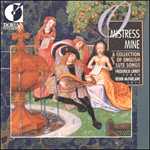

Dorian Recordings
DOR-90136
A COLLECTION OF ENGLISH LUTE SONGS
Frederick Urrey, Tenor
Ronn McFarlane, Lute
 The practice of accompanying the solo voice with lute seems to have originated during the Renaissance. Most surviving examples from before the second half of the 16th century are arrangements of polyphonic vocal compositions, although there are songs for which no polyphonic exemplar can be traced. The French poet Pierre de Ronsard refers in several odes published in 1550 to singing to the accompaniment of the lute; his contemporary Pontus de Tyrad expresses the opinion that ensemble singing might even be regarded as "un vulgaire usage" by comparison to solo singing. - R. Peter Wolf ©1990
The practice of accompanying the solo voice with lute seems to have originated during the Renaissance. Most surviving examples from before the second half of the 16th century are arrangements of polyphonic vocal compositions, although there are songs for which no polyphonic exemplar can be traced. The French poet Pierre de Ronsard refers in several odes published in 1550 to singing to the accompaniment of the lute; his contemporary Pontus de Tyrad expresses the opinion that ensemble singing might even be regarded as "un vulgaire usage" by comparison to solo singing. - R. Peter Wolf ©1990
|
[1] Can she excuse my wrongs? - John Dowland (1563-1626) [2] Weep you no more, sad fountains - Dowland [3] Clear or cloudy - Dowland [4] Lute Solo: Mall Symes - Anon. (c.1600) [5] Lute Solo: The Cobbler - Anon. [6] I care not for these ladies - Thomas Campion [7] Shall I come sweet love to thee? - Campion [8] Beauty, since you so much desire - Campion [9] Lute Solo: Go from my window - Anon. (c.1600) [10-11] Lute Solo: Pegaramsey / Robin Reddock - Anon. (c.1595) [12] Say love if ever thou didst find - Dowland [13] Come heavy sleep - Dowland [14] Awake, sweet love - Dowland [15] Go crystal tears - Dowland [16] Fine knacks for ladies - Dowland [17] Lute Solo: Fantasia#3 - Anthony Holborne (d.1602) [18] If she forsake me - Philip Rosseter (c.1568-1623) [19] Lute Solo: Piece without title - Holborne [20] No grave for woe - Rosseter [21] Lute Solo: Heigh Ho Holiday - Holborne [22] Shall I sue - Dowland [23] I saw my lady weep - Dowland [24] Come away, come sweet love - Dowland [25] Lute Solo: Fantasia Graegorii - Gregory Huwet [26] Thyrsis and Milla - Thomas Morley (1557-1602) [27] O mistress mine - Morley 8 course lute by Andrew Rutherford, New York, 1986 |
Dorian Recordings & Dorian Discovery
are distributed in Australia by Rockian Trading